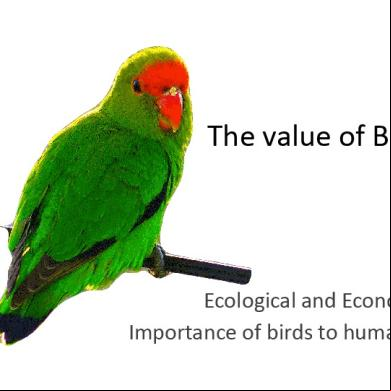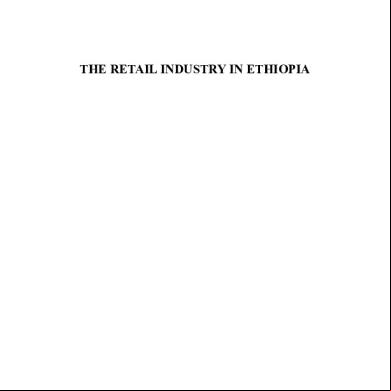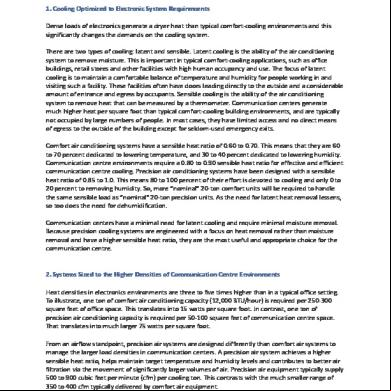The Value Of Birds: Ecological And Economic Importance Of Birds To Humanity d1j1l
This document was ed by and they confirmed that they have the permission to share it. If you are author or own the copyright of this book, please report to us by using this report form. Report 3b7i
Overview 3e4r5l
& View The Value Of Birds: Ecological And Economic Importance Of Birds To Humanity as PDF for free.
More details w3441
- Words: 731
- Pages: 16
The value of Birds
Ecological and Economic Importance of birds to humanity
Outline • • • • • •
Why birds? Ecological values Education values Economic values Cultural values Conclusions
Why worry about birds? • Birds add life sound and color to our lives. • Birds provide intangible aesthetic enjoyment • But intangible benefits usually don’t mean anything to a large section of the public i.e. decision-makers, economists, farmers, developers, agriculturists etc. • We need to look at birds from the perspective of enhancing our lives or generating income.
Do birds really matter? • They keep farmers in business (pest biocontrol) • They slow the spread of disease (scavenging) • They are pollinators of flowers (fruit produce) • They provide us with timber from forests (seed dispersal)
Ecological values of birds
• Invaluable indicators of biodiversity • Biological control of pests i.e. rodents & insects • Seed dispersal and pollination • Scavenging – free clean up service _ value to human/public health.
Education value of birds • Provide excellent tools of reaching the public on environmental education and conservation awareness. • Mainly because they are found almost everywhere including rural and urban settings, in all types of habitats and ecosystems.
Economic value of birds • We eat birds (good source of protein) _ The chicken is a domesticated wild bird. A number of bird species are hunted every year to fill the pots. • Crop pests destroy some 25 % of gross national produce in developing nations. • Birds save millions of tons of agricultural produce every year by feeding on crop pests.
Economic value of birds • Avitourism is a growing section of nature tourism • Bird-watching, a popular hobby around the world, can present significant economic opportunities for countries through sustainable tourism. • Millions of birdwatchers go to distance places to “list” birds spending millions of dollars.
Economic value of birds • In the USA alone, birdwatchers are estimated to spend over $2.5 billion each year with 40 % of American birders willing to travel to discover new bird watching opportunities (Birdlife Int, 2015).
Economic value of birds • Generates millions in foreign exchange world over creating employment for thousands of people. • Ethiopia has some 862 bird species of which 17 are endemic (only found in the political boundaries of Ethiopia).
• A bird watcher would need to travel great distances to see these endemic species thus promoting livelihoods, job creation and generating much needed income.
Economic value of birds • There is a direct link between conservation of nature and nature tourism because the tourism can only be promoted if we conserve our resources. • Avitourism has been used as a tool for achieving conservation and development outcomes in rural areas of South Africa, Costa Rica, Mexico • Job creation and income generation can be an excellent way of appreciating the value of birds
Economic value of birds • Birding destinations in Ethiopia are mainly in the rift valley, south and southeastern areas. There are of course other sites that are more remote but with similar potential in western eastern Ethiopia. • The diversity of ecosystems in Ethiopia plays a role in providing a rich avifauna.
Economic value of birds • Consequently, with proper organization sustainable nature tourism can present a favorable way of generating income and protecting nature. • One of the areas is capacity building of communities to handle tours. • In of avitourism it can mean training in handling bird tours, customer relations,guiding and bird identification amongst others.
In conclusion • Birds have been undervalued but a holistic way of approaching their benefits can be achieved by educating the public and youth in particular. • Ethiopia has great potential in of its avifaunal resources and this can be channeled to generate income and promote sustainable livelihoods.
Thank you for listening!
Yilma Dellelegn Ethiopian Wildlife & Natural History Society Mobile:0911 400636 [email protected]
Picture credits • • • • • • • • •
Title page – Black-winged Lovebird _Yilma D Abebe Page 1 _ Vitteline Masked Weaver _Yilma D. Abebe Page 3_ Greater Flamingos _Yilma D. Abebe Page 5 _ White backed Vultures feeding on carcass_ Yilma D. Abebe Page 6_ Ethiopian Bushcrow _ Paul Donald Page 9_ White-tailed Swallow _ Paul Donald Page 10_Subadult African Fish Eagle_ Yilma D. Abebe Page 11_ Marabou Stork_Yilma D. Abebe Page 15_Prince Ruspoli’s Turaco_ Steve Rooke
Ecological and Economic Importance of birds to humanity
Outline • • • • • •
Why birds? Ecological values Education values Economic values Cultural values Conclusions
Why worry about birds? • Birds add life sound and color to our lives. • Birds provide intangible aesthetic enjoyment • But intangible benefits usually don’t mean anything to a large section of the public i.e. decision-makers, economists, farmers, developers, agriculturists etc. • We need to look at birds from the perspective of enhancing our lives or generating income.
Do birds really matter? • They keep farmers in business (pest biocontrol) • They slow the spread of disease (scavenging) • They are pollinators of flowers (fruit produce) • They provide us with timber from forests (seed dispersal)
Ecological values of birds
• Invaluable indicators of biodiversity • Biological control of pests i.e. rodents & insects • Seed dispersal and pollination • Scavenging – free clean up service _ value to human/public health.
Education value of birds • Provide excellent tools of reaching the public on environmental education and conservation awareness. • Mainly because they are found almost everywhere including rural and urban settings, in all types of habitats and ecosystems.
Economic value of birds • We eat birds (good source of protein) _ The chicken is a domesticated wild bird. A number of bird species are hunted every year to fill the pots. • Crop pests destroy some 25 % of gross national produce in developing nations. • Birds save millions of tons of agricultural produce every year by feeding on crop pests.
Economic value of birds • Avitourism is a growing section of nature tourism • Bird-watching, a popular hobby around the world, can present significant economic opportunities for countries through sustainable tourism. • Millions of birdwatchers go to distance places to “list” birds spending millions of dollars.
Economic value of birds • In the USA alone, birdwatchers are estimated to spend over $2.5 billion each year with 40 % of American birders willing to travel to discover new bird watching opportunities (Birdlife Int, 2015).
Economic value of birds • Generates millions in foreign exchange world over creating employment for thousands of people. • Ethiopia has some 862 bird species of which 17 are endemic (only found in the political boundaries of Ethiopia).
• A bird watcher would need to travel great distances to see these endemic species thus promoting livelihoods, job creation and generating much needed income.
Economic value of birds • There is a direct link between conservation of nature and nature tourism because the tourism can only be promoted if we conserve our resources. • Avitourism has been used as a tool for achieving conservation and development outcomes in rural areas of South Africa, Costa Rica, Mexico • Job creation and income generation can be an excellent way of appreciating the value of birds
Economic value of birds • Birding destinations in Ethiopia are mainly in the rift valley, south and southeastern areas. There are of course other sites that are more remote but with similar potential in western eastern Ethiopia. • The diversity of ecosystems in Ethiopia plays a role in providing a rich avifauna.
Economic value of birds • Consequently, with proper organization sustainable nature tourism can present a favorable way of generating income and protecting nature. • One of the areas is capacity building of communities to handle tours. • In of avitourism it can mean training in handling bird tours, customer relations,guiding and bird identification amongst others.
In conclusion • Birds have been undervalued but a holistic way of approaching their benefits can be achieved by educating the public and youth in particular. • Ethiopia has great potential in of its avifaunal resources and this can be channeled to generate income and promote sustainable livelihoods.
Thank you for listening!
Yilma Dellelegn Ethiopian Wildlife & Natural History Society Mobile:0911 400636 [email protected]
Picture credits • • • • • • • • •
Title page – Black-winged Lovebird _Yilma D Abebe Page 1 _ Vitteline Masked Weaver _Yilma D. Abebe Page 3_ Greater Flamingos _Yilma D. Abebe Page 5 _ White backed Vultures feeding on carcass_ Yilma D. Abebe Page 6_ Ethiopian Bushcrow _ Paul Donald Page 9_ White-tailed Swallow _ Paul Donald Page 10_Subadult African Fish Eagle_ Yilma D. Abebe Page 11_ Marabou Stork_Yilma D. Abebe Page 15_Prince Ruspoli’s Turaco_ Steve Rooke










